Political science
Political science, occasionally called politology, is a discipline of social science which deals with systems of governance, and the analysis of political activities, political thoughts, associated constitutions and political behavior.[1]
| Part of a series on |
| Politics |
|---|
.svg.png.webp) |
|
|
Political science is generally divided into distinct sub-disciplines, namely domestic politics and government, comparative politics (including area studies), international relations, political theory, political economy, political methodology, public administration, public policy.[2] Furthermore, political science is related to, and draws upon, the fields of economics, law, sociology, history, philosophy, human geography, journalism, political anthropology, and social policy.
Comparative politics is the science of comparison and teaching of different types of constitutions, political actors, legislature and associated fields, all of them from an intrastate perspective. International relations deals with the interaction between nation-states as well as intergovernmental and transnational organizations. Political theory is more concerned with contributions of various classical and contemporary thinkers and philosophers.
Political science is methodologically diverse and appropriates many methods originating in psychology, social research and cognitive neuroscience. Approaches include positivism, interpretivism, rational choice theory, behaviouralism, structuralism, post-structuralism, realism, institutionalism, and pluralism. Political science, as one of the social sciences, uses methods and techniques that relate to the kinds of inquiries sought: primary sources, such as historical documents and official records, secondary sources such as scholarly journal articles, survey research, statistical analysis, case studies, experimental research, and model building.
History
Origins
As a social political science, contemporary political science started to take shape in the latter half of the 19th century. At that time it began to separate itself from political philosophy, which traces its roots back to the works of Aristotle and Plato, which were written nearly 2,500 years ago. The term "Political Science" was not always distinguished from political philosophy, and the modern discipline has a clear set of antecedents including also moral philosophy, political economy, political theology, history, and other fields concerned with normative determinations of what ought to be and with deducing the characteristics and functions of the ideal state.
The advent of political science as a university discipline was marked by the creation of university departments and chairs with the title of political science arising in the late 19th century. In fact, the designation "political scientist" is typically for those with a doctorate in the field, but can also apply to those with a master's in the subject.[3] Integrating political studies of the past into a unified discipline is ongoing, and the history of political science has provided a rich field for the growth of both normative and positive political science, with each part of the discipline sharing some historical predecessors. The American Political Science Association and the American Political Science Review were founded in 1903 and 1906, respectively, in an effort to distinguish the study of politics from economics and other social phenomena.
Behavioural revolution and new institutionalism
In the 1950s and the 1960s, a behavioural revolution stressing the systematic and rigorously scientific study of individual and group behaviour swept the discipline. A focus on studying political behaviour, rather than institutions or interpretation of legal texts, characterized early behavioural political science, including work by Robert Dahl, Philip Converse, and in the collaboration between sociologist Paul Lazarsfeld and public opinion scholar Bernard Berelson.
The late 1960s and early 1970s witnessed a take off in the use of deductive, game theoretic formal modelling techniques aimed at generating a more analytical corpus of knowledge in the discipline. This period saw a surge of research that borrowed theory and methods from economics to study political institutions, such as the United States Congress, as well as political behaviour, such as voting. William H. Riker and his colleagues and students at the University of Rochester were the main proponents of this shift.
Despite considerable research progress in the discipline based on all the kinds of scholarship discussed above, it has been observed that progress toward systematic theory has been modest and uneven.[4]
Recent developments
In 2000, the Perestroika Movement in political science was introduced as a reaction against what supporters of the movement called the mathematicization of political science. Those who identified with the movement argued for a plurality of methodologies and approaches in political science and for more relevance of the discipline to those outside of it.[5]
Some evolutionary psychology theories argue that humans have evolved a highly developed set of psychological mechanisms for dealing with politics. However, these mechanisms evolved for dealing with the small group politics that characterized the ancestral environment and not the much larger political structures in today's world. This is argued to explain many important features and systematic cognitive biases of current politics.[6]
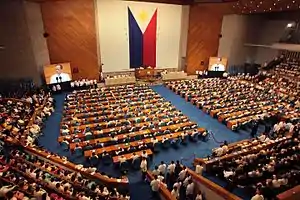

.jpg.webp)
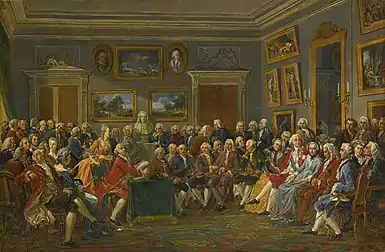
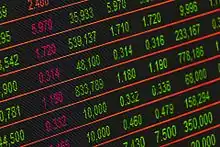
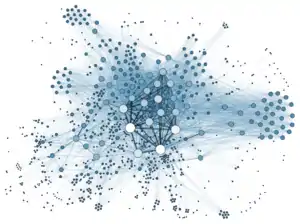
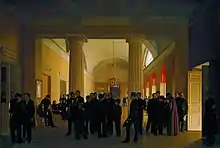
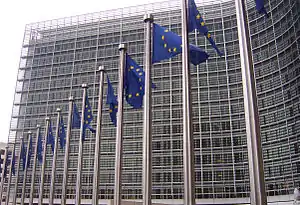
Overview
Political science is a social study concerning the allocation and transfer of power in decision making, the roles and systems of governance including governments and international organizations, political behaviour and public policies. They measure the success of governance and specific policies by examining many factors, including stability, justice, material wealth, peace and public health. Some political scientists seek to advance positive (attempt to describe how things are, as opposed to how they should be) theses by analysing politics. Others advance normative theses, by making specific policy recommendations. The study of politics and policies can be closely connected, for example in comparative analyses of which types of political institutions tend to produce certain types of policies.[7]
Political scientists may provide the frameworks from which journalists, special interest groups, politicians, and the electorate analyse issues. According to Chaturvedy,
Political scientists may serve as advisers to specific politicians, or even run for office as politicians themselves. Political scientists can be found working in governments, in political parties or as civil servants. They may be involved with non-governmental organizations (NGOs) or political movements. In a variety of capacities, people educated and trained in political science can add value and expertise to corporations. Private enterprises such as think tanks, research institutes, polling and public relations firms often employ political scientists.[8]
Country-specific studies
Political scientists may study political phenomena within one specific country; for example, they may study just the politics of the United States,[9] or just the politics of China.[10]
In the case of the United States, political scientists known as "Americanists" look at a variety of data including constitutional development, elections, public opinion, and public policy such as Social Security reform, foreign policy, US Congressional committees, and the US Supreme Court. Political scientists will often focus on the politics of their own country, so for example a political scientist from Indonesia may become an expert in the politics of Indonesia.[11]
Anticipating crises
The theory of political transitions,[12] and the methods of their analysis and anticipating[13] of crises,[14] form an important part of political science. Several general indicators of crises and methods were proposed for anticipating critical transitions.[15] Among them, a statistical indicator of crisis, simultaneous increase of variance and correlations in large groups, was proposed for crisis anticipation and may be successfully used in various areas.[16] Its applicability for early diagnosis of political crises was demonstrated by the analysis of the prolonged stress period preceding the 2014 Ukrainian economic and political crisis. There was a simultaneous increase in the total correlation between the 19 major public fears in the Ukrainian society (by about 64%) and also in their statistical dispersion (by 29%) during the pre-crisis years.[17] A feature shared by certain major revolutions is that they were not predicted. The theory of apparent inevitability of crises and revolutions was also developed.[18]
The study of major crises, both political crises and external crises that can affect politics, is not limited to attempts to predict regime transitions or major changes in political institutions. Political scientists also study how governments handle unexpected disasters, and how voters in democracies react to their governments' preparations for and responses to crises.[19]
Cognate fields
Most political scientists work broadly in one or more of the following five areas:
- Political philosophy or political theory
- Public administration
- Public law
- Public policy
- Program evaluation
Program evaluation is a systematic method for collecting, analyzing, and using information to answer questions about projects, policies and programs,[20] particularly about their effectiveness and efficiency. In both the public and private sectors, stakeholders often want to know whether the programs they are funding, implementing, voting for, receiving or objecting to are producing the intended effect. While program evaluation first focuses around this definition, important considerations often include how much the program costs per participant, how the program could be improved, whether the program is worthwhile, whether there are better alternatives, if there are unintended outcomes, and whether the program goals are appropriate and useful.[21]
Policy analysis is a technique used in public administration to enable civil servants, activists, and others to examine and evaluate the available options to implement the goals of laws and elected officials.
Some political science departments also classify methodology as well as scholarship on the domestic politics of a particular country as distinct fields. In the United States, American politics is often treated as a separate subfield.
In contrast to this traditional classification, some academic departments organize scholarship into thematic categories, including political philosophy, political behaviour (including public opinion, collective action, and identity), and political institutions (including legislatures and international organizations). Political science conferences and journals often emphasize scholarship in more specific categories. The American Political Science Association, for example, has 42 organized sections that address various methods and topics of political inquiry.[22]
Research methods
Political science is methodologically diverse; political scientists approach the study of politics from a host of different ontological orientations and with a variety of different tools. Because political science is essentially a study of human behaviour, in all aspects of politics, observations in controlled environments are often challenging to reproduce or duplicate, though experimental methods are increasingly common (see experimental political science).[23] Citing this difficulty, former American Political Science Association President Lawrence Lowell once said "We are limited by the impossibility of experiment. Politics is an observational, not an experimental science."[13] Because of this, political scientists have historically observed political elites, institutions, and individual or group behaviour in order to identify patterns, draw generalizations, and build theories of politics.
Like all social sciences, political science faces the difficulty of observing human actors that can only be partially observed and who have the capacity for making conscious choices unlike other subjects such as non-human organisms in biology or inanimate objects as in physics. Despite the complexities, contemporary political science has progressed by adopting a variety of methods and theoretical approaches to understanding politics, and methodological pluralism is a defining feature of contemporary political science.
Empirical political science methods include the use of field experiments,[24] surveys and survey experiments,[25] case studies,[26] process tracing,[27][28] historical and institutional analysis,[29] ethnography,[30] participant observation,[31] and interview research.[32]
Political scientists also use and develop theoretical tools like game theory and agent based models to study a host of political systems and situations.[33]
Political theorists approach theories of political phenomenon with a similar diversity of positions and tools, including Feminist political theory, historical analysis associated with the Cambridge school, Straussian approaches, and others.
Political science may overlap with topics of study that are the traditional focuses of other social sciences, for example when sociological norms or psychological biases are connected to political phenomena. In these cases, political science may either inherit their methods of study or it may develop a contrasting approach.[34] For example, Lisa Wedeen has argued that political science's approach to the idea of culture, originating with Gabriel Almond and Sidney Verba and exemplified by authors like Samuel P. Huntington, could benefit from aligning more closely with the study of culture in anthropology.[34] In turn, methodologies that are developed within political science may influence the way that researchers in other fields, like public health, conceive of and approach political processes and policies.[35]
Education
Political science, possibly like the social sciences as a whole, "as a discipline lives on the fault line between the 'two cultures' in the academy, the sciences and the humanities."[36] Thus, in some American colleges where there is no separate School or College of Arts and Sciences per se, political science may be a separate department housed as part of a division or school of Humanities or Liberal Arts.[37] Whereas classical political philosophy is primarily defined by a concern for Hellenic and Enlightenment thought, political scientists are also marked by a great concern for "modernity" and the contemporary nation state, along with the study of classical thought, and as such share a greater deal of terminology with sociologists (e.g. structure and agency).
Most United States colleges and universities offer B.A. programs in political science. M.A. or M.A.T. and Ph.D. or Ed.D. programs are common at larger universities. The term political science is more popular in North America than elsewhere; other institutions, especially those outside the United States, see political science as part of a broader discipline of political studies, politics, or government. While political science implies use of the scientific method, political studies implies a broader approach, although the naming of degree courses does not necessarily reflect their content. Separate programs (often professional degrees) in international relations and public policy are not uncommon at both the undergraduate and postgraduate levels. Master's level programs in public administration are professional degrees covering public policy along with other applied subjects; they are often seen as more linked to politics than any other discipline, which may be reflected by being housed in that department.[38]
The national honour society for college and university students of government and politics in the United States is Pi Sigma Alpha.
See also
- History of political science
- Outline of political science – structured list of political topics, arranged by subject area
- Index of politics articles – alphabetical list of political subjects
- Political philosophy
- Political science terminology
- Political lists – lists of political topics
References
- Definition from Lexico powered by Oxford University Press. Retrieved 23 February 2020
- Roskin, Michael G. (11 August 2005). "Political Science". Encylopaedia Britannica. Retrieved 30 January 2021.
- Bureau of Labor Statistics, U.S. Department of Labor. "How to Become a Political Scientist". Retrieved 13 September 2016.
- Kim Quaile Hill, "In Search of General Theory," Journal of Politics 74 (October 2012), 917–31.
- Perestroika!: The Raucous Rebellion in Political Science. Yale University Press. 30 September 2005. ISBN 978-0-300-13020-1.
- Michael Bang Petersen. "The evolutionary psychology of mass politics". In Roberts, S.C. (2011). Roberts, S. Craig (ed.). Applied Evolutionary Psychology. Oxford University Press. doi:10.1093/acprof:oso/9780199586073.001.0001. ISBN 978-0-19-958607-3.
- Roller, Edeltraud (2005). The Performance of Democracies: Political Institutions and Public Policy. Oxford University Press.
- Chaturvedy, J.C. (2005). Political Governance: Political theory. Isha Books. p. 4. ISBN 978-81-8205-317-5. Retrieved 28 October 2014.
- Benjamin Ginsberg; Theodore J. Lowi; Margaret Weir; Caroline J. Tolbert; Robert J. Spit (December 2012). We the People: An Introduction to American Politics. W. W. Norton & Company. ISBN 978-0393921106.
- Oi, Jean C. (1989). State and Peasant in Contemporary China: The Political Economy of Village Government. University of California Press. p. xvi.
- "Sekelumit Prof. Dr. Miriam Budiardjo" (in Indonesian). Indonesian Political Science Association. 25 October 2013. Retrieved 1 October 2020.
- Acemoglu D., Robinson J.A. "A theory of political transitions." American Economic Review. 2001 Sep 1:938–63.
- Lowell, A. Lawrence. 1910. "The Physiology of Politics." American Political Science Review 4: 1–15.
- McClelland C.A. "The Anticipation of International Crises: Prospects for Theory and Research." International Studies Quarterly, Vol. 21, No. 1, Special Issue on International Crisis: Progress and Prospects for Applied Forecasting and Management (March 1977), pp. 15–38
- Scheffer M., Carpenter S.R., Lenton T.M., Bascompte J., Brock W., Dakos V., Van De Koppel J., Van De Leemput I.A., Levin S.A., Van Nes E.H., Pascual M. "Anticipating critical transitions." Science. 2012 Oct 19; 338(6105):344–48.
- Gorban, A.N.; Smirnova, E.V.; Tyukina, T.A. (August 2010). "Correlations, risk and crisis: From physiology to finance". Physica A: Statistical Mechanics and Its Applications. 389 (16): 3193–217. arXiv:0905.0129. Bibcode:2010PhyA..389.3193G. doi:10.1016/j.physa.2010.03.035. S2CID 276956.
- Rybnikov, S.R.; Rybnikova, N.A.; Portnov, B.A. (March 2017). "Public fears in Ukrainian society: Are crises predictable?". Psychology & Developing Societies. 29 (1): 98–123. doi:10.1177/0971333616689398. S2CID 151344338.
- Kuran T. "Sparks and prairie fires: A theory of unanticipated political revolution." Public Choice, Vol. 61, No. 1 (April 1989), pp. 41–74
- Andrew Healy; Neil Malhotra (2009). "Myopic Voters and Natural Disaster Policy". American Political Science Review. 103 (3): 387–406. doi:10.1017/S0003055409990104. S2CID 32422707.
- Administration for Children and Families (2010) The Program Manager's Guide to Evaluation. Chapter 2: What is program evaluation?.
- Shackman, Gene (11 February 2018). "What Is Program Evaluation: A Beginner's Guide". The Global Social Change Research Project. SSRN 3060080. Cite journal requires
|journal=(help) - Organized Sections APSA(subscription required)
- Druckman, James; Green, Donald; Kuklinski, James; et al., eds. (2011). Cambridge Handbook of Experimental Political Science. New York: Cambridge University Press. ISBN 978-0-521-17455-8.
- Nahomi Ichino; Noah L. Nathan (May 2013). "Crossing the Line: Local Ethnic Geography and Voting in Ghana". American Political Science Review. 107 (2): 344–361. doi:10.1017/S0003055412000664. S2CID 9092626.
- "The Progress and Pitfalls of Using Survey Experiments in Political Science". Oxford Research Encyclopedia. Oxford: Oxford University Press. February 2020.
- Skocpol, Theda (1979). States and Social Revolutions. Cambridge University Press. ISBN 978-0-521-29499-7.
- Mahoney, James (2 March 2012). "The Logic of Process Tracing Tests in the Social Sciences". Sociological Methods & Research. 41 (4): 570–597. doi:10.1177/0049124112437709. S2CID 122335417.
- Zaks, Sherry (July 2017). "Relationships Among Rivals (RAR): A Framework for Analyzing Contending Hypotheses in Process Tracing". Political Analysis. 25 (3): 344–362. doi:10.1017/pan.2017.12.
- Thelen, Kathleen (1999). "Historical institutionalism in comparative politics". Annual Review of Political Science. 2: 369–404. doi:10.1146/annurev.polisci.2.1.369.
- Brodkin, Evelyn Z. (January 2017). "The Ethnographic Turn in Political Science: Reflections on the State of the Art". PS: Political Science & Politics. 50 (1): 131–134. doi:10.1017/S1049096516002298.
- Cramer, Katherine J. (2016). The Politics of Resentment. University of Chicago Press.
- Layna Mosley, ed. (2013). Interview Research in Political Science. Cornell University Press. ISBN 978-0801478635.
- Fiorina, Morris P. (February 1975). "Formal Models in Political Science". American Journal of Political Science. 19 (1): 133–159. doi:10.2307/2110698. JSTOR 2110698.
- Wedeen, Lisa (December 2002). "Conceptualizing Culture: Possibilities for Political Science". The American Political Science Review. 95 (4): 713–728. doi:10.1017/S0003055402000400. S2CID 145130880.
- Nicole F. Bernier; Carole Clavier (1 March 2011). "Public health policy research: making the case for a political science approach". Health Promotion International. 26 (1): 109–116. doi:10.1093/heapro/daq079. PMID 21296911.
- Stoner, J.R. (22 February 2008). "Political Science and Political Education". Paper presented at the annual meeting of the APSA Teaching and Learning Conference (APSA), San Jose Marriott, San Jose, California. Archived from the original on 30 November 2009. Retrieved 19 October 2011.
…although one might allege the same for social science as a whole, political scientists receive funding from and play an active role in both the National Science Foundation and the National Endowment for the Humanities [in the United States].
- See, e.g., the department of Political Science at Marist College, part of a Division of Humanities before that division became the School of Liberal Arts (c. 2000).
- Vernardakis, George (1998). Graduate education in government. University Press of America. p. 77. ISBN 978-0-7618-1171-8.
…existing practices at Harvard University, the University of California at Berkeley, and the University of Michigan.
Further reading
- The Evolution of Political Science (November 2006). APSR Centennial Volume of American Political Science Review. Apsanet. 4 February 2009.
- European Political Processes: Essays and Readings (1968). [Compiled and] ed., with original essays, by Henry S. Albinski [and] Lawrence K. Pettit. Boston: Allyn & Bacon. vii, 448 p.
- Goodin, R.E.; Klingemann, Hans-Dieter (1996). A New Handbook of Political Science. Oxford and New York: Oxford University Press. ISBN 0-19-829471-9.
- Grinin, L., Korotayev, A. and Tausch A. (2016) Economic Cycles, Crises, and the Global Periphery. Springer International Publishing, Heidelberg, New York, Dordrecht, London, ISBN 978-3-319-17780-9;
- Klingemann, Hans-Dieter, ed. (2007) The State of Political Science in Western Europe. Opladen: Barbara Budrich Publishers. ISBN 978-3-86649-045-1.
- Noel, Hans (2010-10-14 | DOI https://doi.org/10.2202/1540-8884.1393) "Ten Things Political Scientists Know that You Don’t" The Forum: Vol. 8: Iss. 3, Article 12. de Gruyter.
- Roskin, M.; Cord, R.L.; Medeiros, J.A.; Jones, W.S. (2007). Political Science: An Introduction. 10th ed. New York: Pearson Prentice Hall. ISBN 978-0-13-242575-9.
- Schram, S.F.; Caterino, B., eds. (2006). Making Political Science Matter: Debating Knowledge, Research, and Method. New York and London: New York University Press. Google Books 4 February 2009.
- Tausch, A.; Prager, F. (1993). Towards a Socio-Liberal Theory of World Development. Basingstoke: Macmillan; New York: St. Martin's Press and Springer.
- Tausch, Arno; Heshmati, Almas; Karoui, Hichem (2015). The political algebra of global value change. General models and implications for the Muslim world (1st ed.). New York: Nova Science. ISBN 978-1-62948-899-8.
- Oxford Handbooks of Political Science
- Zippelius, Reinhold (2003). Geschichte der Staatsideen (History of political Ideas), 10th ed. Munich: C.H. Beck. ISBN 3-406-49494-3.
- Zippelius, Reinhold (2010). Allgemeine Staatslehre, Politikwissenschaft (Political Science),16th ed. Munich: C.H. Beck. ISBN 978-3-406-60342-6.
External links
| Wikibooks has a book on the topic of: Political Science |
| Wikimedia Commons has media related to Political science. |
| Wikiquote has quotations related to: Political science |
Professional organizations
- European Consortium for Political Research
- Institute for Comparative Research in Human and Social Sciences (ICR) in Japan
- International Association for Political Science Students
- International Political Science Association
- International Studies Association
- Midwest Political Science Association
- Political Studies Association of the UK
- Southern Political Science Association
Further reading
Library guides
- Library. "Political Science". Research Guides. United States: University of Michigan. Archived from the original on 7 July 2014. Retrieved 15 February 2014.
- Bodleian Libraries. "Political Science". LibGuides. United Kingdom: University of Oxford. Archived from the original on 18 February 2014. Retrieved 15 February 2014.
- Library. "Politics Research Guide". LibGuides. New Jersey, United States: Princeton University. Archived from the original on 23 July 2014. Retrieved 15 February 2014.
- Libraries. "Political Science". Research Guides. New York, United States: Syracuse University. Archived from the original on 8 July 2014. Retrieved 15 February 2014.
- University Libraries. "Political Science". Research Guides. United States: Texas A&M University. Archived from the original on 21 October 2014. Retrieved 15 February 2014.